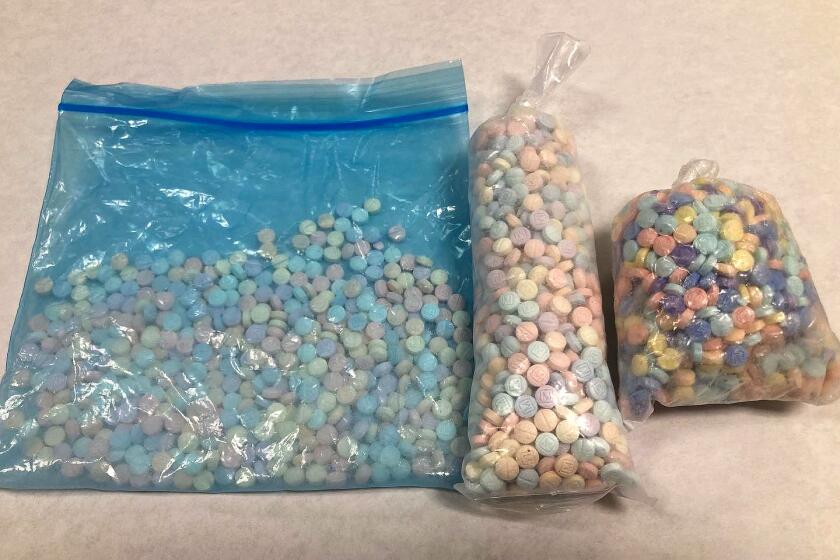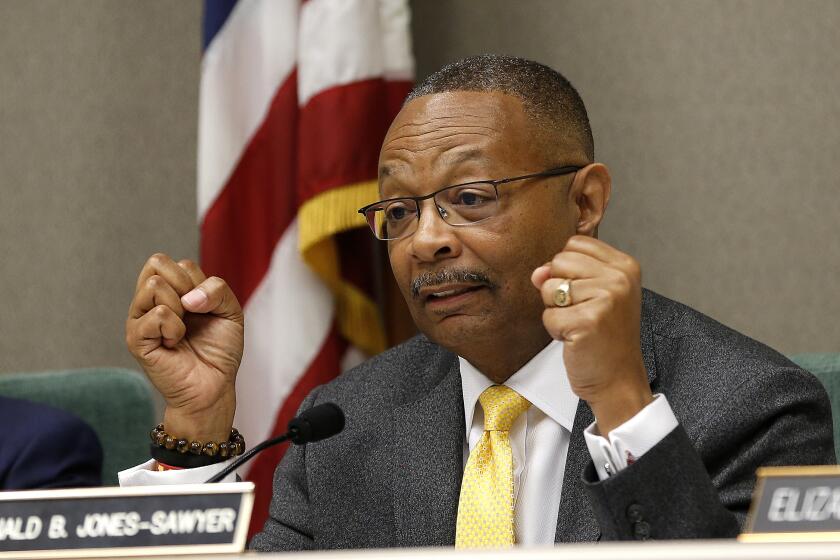Newsom announces plan to crack down on deadly street drug known as ‘tranq’

- Share via
Amid a growing drug overdose crisis and debate over how the state should respond, Gov. Gavin Newsom on Tuesday announced he will sponsor legislation to increase penalties for the trafficking of xylazine, the deadly and flesh-rotting animal tranquilizer drug known as “tranq.”
Newsom administration officials provided few details on what the bill might include other than it would classify xylazine as a controlled substance and increase criminal penalties for illegal trafficking of the drug. Veterinary use would still be allowed.
“Tranq poses a unique and devastating challenge in our fight against the overdose epidemic,” Newsom said in a statement. “Although California is not yet seeing tranq at the same rates as other parts of the country, this legislation will help the state stay ahead and curb dealers and traffickers, while we work to provide treatment and resources for those struggling with addiction and substance abuse.”
Xylazine is a nonopiate sedative and muscle relaxant that is only authorized for veterinary use, but the drug can be mixed with fentanyl and has increasingly been detected in a growing number of overdose deaths across California and the country. Similar to fentanyl, xylazine is addictive and potentially deadly, and can also cause painful ulcers to form on the skin.
Five months after public health officials warned Angelenos that a dangerous flesh-eating sedative may have infiltrated local street drug supplies, the Los Angeles County Sheriff’s Department confirmed that it has.
Newsom rarely sponsors bills, but said the action is necessary to address the growing drug epidemic that has contributed to thousands of deaths in California each year. Between January and August, there were 19 accidental overdose deaths involving xylazine in San Francisco alone, according to overdose data published by the city.
Civil liberties groups have successfully thwarted similar measures targeting fentanyl in recent years, arguing that increased criminal penalties for dealers would only lead to a resurgence of the failed war on drugs and ultimately refill prisons.
“Though we understand that this legislation is supposed to focus on those ‘trafficking’ the drug xylazine, we have seen throughout history that these laws often end up criminalizing low-level dealers and users,” Jeronimo Aguilar, a policy analyst for Legal Services for Prisoners with Children, said in a statement.
Newsom’s proposal did not provide details on how drug trafficking would be targeted.
“The Governor and his staff are working closely with the legislature and stakeholders to refine what the penalties should look like to prevent the illicit use of tranq in [California],” said Brandon Richards, a spokesperson for Newsom. “We’ll have more to share as those conversations progress and the legislative session gets underway.”
Newsom signed several fentanyl bills into law this year. Other bills, including measures supported by Republicans and moderate Democrats advocating for stiffer penalties for drug dealing, failed to pass out of the state legislature.
Saying they want to decrease California’s prison population, lawmakers kill bills to increase criminal penalties for fentanyl dealers.
“I wish this happened a while ago when we were pushing legislation pertaining to fentanyl,” Assemblymember Joe Patterson (R-Rocklin) told The Times. “Nevertheless, making progress on another drug being mixed with fentanyl and killing our kids and adults is a positive thing.”
Patterson sits on the Select Committee on Fentanyl, Opioid Addiction, and Overdose Prevention and made his own attempt at fentanyl legislation last year, but it failed to get enough votes in the Assembly Public Safety Committee.
Sen. Tom Umberg (D-Orange) said he is “pleased” with the governor’s announcement. Umberg sponsored his own fentanyl bill last year, but it was voted down by his fellow lawmakers.
Umberg said that while he is focused on fentanyl, he also supports comprehensive legislation that would factor in prevention treatment in addition to law enforcement.
Newsom’s office also announced that the California Department of Public Health sent a letter notifying facilities and clinicians of the emergence of xylazine and what actions they should take to keep patients safe. The California State Board of Pharmacy and the California Veterinary Medical Board have alerted practitioners of the dangers of the drug.
More to Read
Sign up for Essential California
The most important California stories and recommendations in your inbox every morning.
You may occasionally receive promotional content from the Los Angeles Times.
















